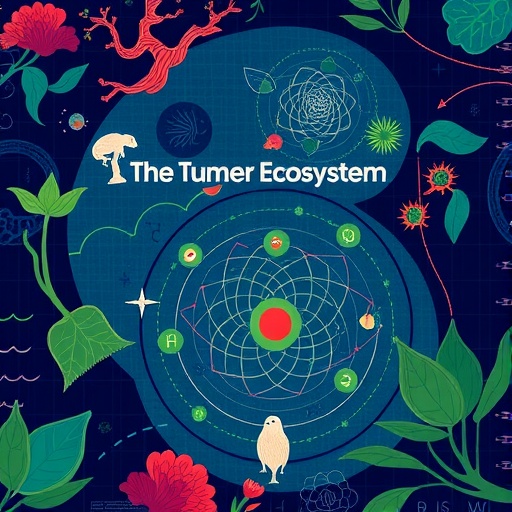In a groundbreaking initiative that promises to reshape our understanding of cancer biology and treatment, The University of Texas MD Anderson Cancer Center, in collaboration with the global publishing titan Springer Nature, has announced a free, in-person conference titled “The Tumor Ecosystem – From Bench to Clinic and Back.” Scheduled to take place from November 19 to 21, 2025, on the MD Anderson campus in Houston, Texas, this three-day gathering will bring together leading researchers, clinicians, and thought leaders to delve deeply into the multifaceted interactions within the tumor microenvironment and its systemic influences.
At the heart of this conference lies the exploration of the tumor ecosystem—a complex network constituted not solely of cancer cells but also the myriad surrounding components, including immune cells, metabolic agents, the microbiome, and the systemic organ crosstalk that collectively influence tumor progression, metastasis, and therapeutic response. By focusing on this holistic environment, researchers aim to transcend traditional views that isolate cancer cells and instead conceptualize malignancy as a dynamic interaction between cancerous lesions and the host’s integrated biological systems.
This conference arrives at a pivotal moment in oncology, as emerging data increasingly highlight the crucial role of systemic factors and tissue microenvironments in dictating tumor behavior. Recent advances in technology, such as multi-omics profiling, spatial transcriptomics, and single-cell sequencing, have enabled unprecedented insight into the heterogeneity and temporal evolution of tumor ecosystems. The meeting will provide a critical platform for sharing these cutting-edge methodologies and translating them into clinical applications that hold promise for personalized and more effective cancer therapies.
Organized collaboratively by MD Anderson’s clinical and scientific community alongside key figures from notable journals including Nature, Nature Cancer, and Nature Reviews Cancer, the program is structured across five focused sessions. These sessions will intricately examine local and systemic immune effects, metabolic influences on tumor dynamics, the biology underpinning metastatic tumor ecosystems, systemic and organ-specific cross-communication with tumor sites, and patient-centric approaches that integrate clinical outcomes with ecosystem biology.
Keynote presentations from luminaries in cancer research underpin the conference’s scientific rigor and prestige. Dr. Miriam Chalabi from the Netherlands Cancer Institute will share insights into immunotherapeutic strategies shaped by tumor microenvironment interactions, while Dr. Mikala Egeblad of Cold Spring Harbor Laboratory will elucidate how the extracellular matrix and stromal components modulate cancer progression. Notable contributors from MD Anderson including Drs. Jennifer McQuade, Humam Kadara, and Katy Rezvani will further enrich discussions with their expertise spanning tumor immunology, metabolic regulation, and translational oncology.
The tumor ecosystem paradigm emphasizes that tumors are not isolated entities but rather intricately linked with the systemic physiology of the host. Immune cells residing within or traversing the tumor stroma can act as both antagonists and facilitators of progression, depending on their phenotype and activation state. Likewise, metabolic reprogramming within cancer cells and the surrounding microenvironment remodels nutrient availability and bioenergetic pathways, influencing not only tumor survival but also immune evasion and resistance mechanisms.
Moreover, organ-tumor crosstalk is recognized as a fundamental driver of metastatic colonization and dormancy. Signals exchanged between primary tumor sites and distant organs can precondition future metastatic niches, alter local immune landscapes, and modify stromal responses, thereby dictating the course of disease progression and patient prognosis. Understanding these systemic communications holds promise for novel interventions that target not just the tumor but its broader ecosystem.
Central to the conference’s mission is fostering innovative collaborations by catalyzing dialogue across disciplines—from molecular biology and immunology to computational modeling and clinical oncology. Presenters and attendees alike are encouraged to submit abstracts by September 19, 2025, with opportunities for recognition through substantial prizes awarded to the most compelling scientific contributions.
As the field advances, there is burgeoning interest in the role of the cancer microbiome and its bidirectional relationship with host immunity and metabolism. The influence of microbial communities within the tumor microenvironment and distant organs is an emergent frontier, with implications for therapy response and resistance. This conference will provide a critical venue to discuss these novel findings and their translational potential.
Ultimately, by framing cancer through the lens of its ecosystem, the conference aims to accelerate the translation of basic science discoveries into clinical innovations. This integrated perspective encourages development of therapeutic approaches that are multi-modal and adaptive, addressing the tumor as a living system rather than a static target.
MD Anderson’s Chief Scientific Officer, Dr. Giulio Draetta, emphasizes that the conference embodies a unique opportunity to galvanize the global research community around breakthroughs that will enhance understanding and treatment of cancer. The goal is to foster discussions that not only deepen scientific insight but also drive meaningful collaborations, accelerating efforts toward the ultimate objective: ending cancer.
In conjunction with the academic presentations, the conference will feature poster sessions, interactive discussions, and networking events designed to stimulate scientific exchange and community building. Researchers from all over the world are invited to join, share their findings, and contribute to an evolving narrative that places the tumor ecosystem at the forefront of cancer research.
Information regarding registration, abstract submission, and the full agenda is accessible through the dedicated conference portal hosted on the Nature conferences website. By removing barriers to participation with no fees, the organizers seek to cultivate an inclusive environment accelerating collective scientific progress.
Through this comprehensive assembly of expertise, novel methodologies, and integrated frameworks, “The Tumor Ecosystem – From Bench to Clinic and Back” stands poised to be an influential landmark in oncology, promoting a paradigm shift in how cancer is studied and ultimately conquered.
Subject of Research: Tumor ecosystem dynamics, tumor microenvironment, systemic influences on cancer, immunology, metabolism, organ-tumor crosstalk, translational oncology
Article Title: The Tumor Ecosystem Unveiled: MD Anderson and Springer Nature’s 2025 Conference to Revolutionize Cancer Research
News Publication Date: September 10, 2025
Web References:
– https://natureconferences.streamgo.live/tumor-ecosystem/register
– https://faculty.mdanderson.org/profiles/giulio_draetta.html
– https://www.nki.nl/employees/employees/myriam-chalabi/
– https://facultyprofiles.cshl.edu/mikala.egeblad
– https://faculty.mdanderson.org/profiles/jennifer_mcquade.html
– https://faculty.mdanderson.org/profiles/humam_kadara.html
– https://faculty.mdanderson.org/profiles/katy_rezvani.html
Keywords: Tumor microenvironment, tumor ecosystem, cancer immunology, cancer metabolism, metastatic tumor ecosystem, organ-tumor crosstalk, cancer neuroscience, cancer research, scientific collaboration, translational oncology




